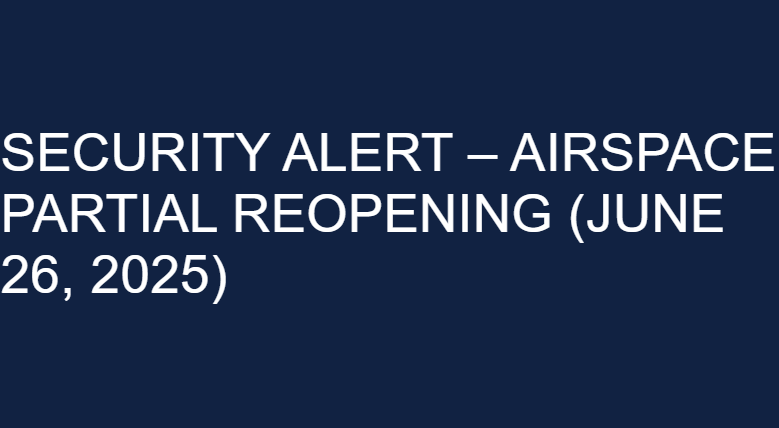
In a significant development following weeks of regional tension, the U.S. Embassy in Iran has issued a security alert announcing the partial Iranian Airspace Reopening. This change comes in the wake of a temporary ceasefire related to the recent Israel-Iran conflict.
For travelers currently in Iran—or those planning transit through the region—this announcement brings both cautious relief and urgent questions. In this article, we break down the current air travel status, U.S. government guidance, and what American citizens need to do next.
What Has Happened?
As of June 26, 2025, Iran has begun partially reopening its airspace, according to a security alert issued by the U.S. Embassy in Tehran.
While the reopening signals a degree of stability after recent military escalations, it is not a full resumption of commercial flight operations. Most international flights remain limited or suspended, and the reliability of scheduled services remains highly uncertain.
Why Was the Airspace Closed?
In early June 2025, military actions involving Iran and Israel escalated rapidly, resulting in security risks across Iranian airspace. This led to:
- Suspension of commercial and civilian flights in and out of Iran.
- Widespread cancellations from international carriers.
- Travel warnings issued by the U.S., UK, and EU nations.
Although a temporary ceasefire is now in place, conditions are still considered volatile, especially near strategic borders and key infrastructure zones.
What Does the U.S. Embassy Recommend?
The U.S. Embassy in Tehran has outlined the following key recommendations for U.S. citizens currently in Iran:
1. Monitor Flight Status Closely
- Not all commercial airlines have resumed service.
- Confirm details directly with airlines or travel agents.
- Be aware of sudden cancellations or airspace closures.
2. Consider Overland Travel Options
If flights are not available, consider land border crossings to neighboring countries:
- Türkiye
- Armenia
- Azerbaijan
- Turkmenistan
Note: Crossing borders may carry its own risks and logistical challenges. Check visa requirements, political climate, and local safety advisories.
3. Enroll in the STEP Program
The Smart Traveler Enrollment Program (STEP) allows U.S. citizens to:
- Receive alerts and updates from the Embassy.
- Enable quicker assistance in emergencies.
Enroll here
What About Other Nationalities?
Although this alert is U.S.-specific, travelers from the UK, Canada, Australia, and EU should also:
- Check for foreign office updates from their respective governments.
- Follow airline advisories and Embassy announcements.
- Avoid high-risk regions like border zones and military facilities.
Airlines Operating with Restrictions
As of June 26:
- Emirates, Qatar Airways, and Turkish Airlines have not yet resumed full operations from Tehran.
- Domestic flights by Iran Air may operate on a limited basis, but schedules are not guaranteed.
- The situation is fluid and could change daily.
What Should Travelers Do Now?
For Current Travelers in Iran:
- Keep your passport, visa, and essential documents ready.
- Maintain regular communication with family or emergency contacts.
- Have a “Go Bag” ready in case of emergency evacuation.
For Those Planning to Travel:
- Avoid non-essential travel to Iran until normalcy is restored.
- If travel is necessary, arrange flexible bookings and travel insurance.
Emergency Contacts for U.S. Citizens
- U.S. Interests Section at the Swiss Embassy in Tehran
Phone: +98 21 2254 2178
Website: swissembassyiran.org - U.S. Department of State – Overseas Citizen Services
Phone: 1-888-407-4747 (from U.S.) or 1-202-501-4444 (from overseas)
Website: travel.state.gov
Final Thoughts
While the partial reopening of Iran’s airspace offers a sign of stabilization, the region remains politically fragile. Travelers must stay informed, act cautiously, and always have a Plan B. The U.S. government is monitoring the situation and may update its guidance as conditions evolve.
Bookmark this page for updates, and stay safe wherever your journey takes you.
Frequently Asked Questions (FAQs)
Travel is still considered risky due to political tensions and partial reopening. Non-essential travel is not advised.
Only partially. Domestic flights may be operating, but international flights remain limited or suspended.
Yes, land routes to countries like Türkiye, Armenia, Azerbaijan, and Turkmenistan are options—check safety and visa rules.
STEP (Smart Traveler Enrollment Program) is a U.S. service that provides travel alerts and connects you to the nearest embassy. Enroll at step.state.gov.
Carry your passport, visa, proof of exit plans, medical essentials, and emergency contact details.
No. The Swiss Embassy in Tehran handles U.S. interests. Contact them for assistance if you’re a U.S. citizen.
Monitor travel updates via travel.state.gov, local news, and airline alerts.
